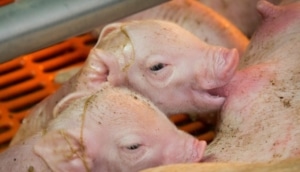In the first 24 hours after birth a piglet should have ingested colostrum. To be exact: 180 to 260 grams per kg of birthweight. Colostrum contains crucial antibodies (immunoglobulins) that boost the piglets immune system.
After birth the piglet starts developing its immune system. In the first weeks of life the immune system is not fully developed yet, making the newborn piglet susceptible for germs. Through her colostrum the mother sow provides her piglets with antibodies against the germs that are present in the farrowing pen. Within the first 24 hours after birth the immunoglobulins are absorbed by the intestinal wall and are able to enter the bloodstream. After ingesting 110 grams of colostrum the intestinal wall of the newborn piglet closes and it no longer absorbs antibodies. The piglet uses the remaining colostrum intake to increase his energy level, grow and produce immune cells. The passive maternal immunity protects the newborn piglet during the first 4 to 6 weeks. Although the passive immunity drops to zero during the same period, the piglet has already developed its active immunity. From week 6 onwards the active immunity takes over the protective function and strengthens over time.
Especially for the lightweight piglets it can be difficult to take in a sufficient amount of colostrum. They often ingest colostrum later than their peers, are more sensitive to cold and more susceptible to bacteria such as streptococci. Unfortunately light weight piglets are often the piglets that spread germs within a litter. The infection pressure rises and the chance that even the better protected peers get sick increases. Wageningen University concluded that piglets that weigh less than 1250 grams at birth have a two to seven times greater risk of dying at a young age than heavier piglets.
Besides genetics the birthweight also affects the growth and performance of the piglet in later life. Piglets with a high birthweight and good genetics show better technical and financial results as a pig and fattening than piglets with a low birthweight. A helping hand towards the udder can help the lightweight piglet to take in the vital colostrum. Yet it is important that both the lightweight piglet and his peers start developing their immune system by drinking colostrum.



